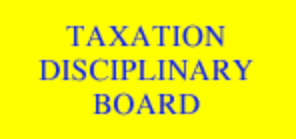About TDB
About us
In 2001 the Chartered Institute of Taxation (“the Institute”) and The Association of Taxation Technicians (‘the Association’) established an independent Taxation Disciplinary Scheme to manage complaints made regarding the professional conduct of members and students of the two bodies.
One of the objectives was to ensure that there was a common approach to procedures and philosophy in handling disciplinary matters, with a consequent improvement in efficiency and effectiveness. In addition, there was an awareness of the concepts of the Human Rights Act and in particular the need for complaints regarding alleged breaches of professional rules of conduct to be considered by committees and tribunals which are independent of the body establishing the rules. Therefore, the disciplinary arrangements, although established by the Institute and the Association, are administered through the independent Taxation Disciplinary Board Limited. Members of the various committees and tribunals set up by the Board consist of individuals who have no current involvement with the professional standards setting of the participating bodies.
The original Scheme covered all complaints received on or after 1 January 2001. Since then, the Scheme has been reviewed and amended in 2008 and 2016 to reflect changes in best practice and various court judgements affecting other regulatory bodies,
Details of the Scheme can be viewed here.
Overall responsibility for the Scheme rests with a small Board. The (lay) Chair is a joint appointee of the original two bodies. The other members are individual appointments made by the participating bodies, and a lay member.
The Scheme is accompanied by regulations governing the procedures which apply to the processing of complaints and disciplinary matters. The Scheme applies to allegations of professional misconduct, inadequate professional service, and conduct unbecoming a professional person. Although the arrangement originally applied only to members of the Institute and the Association, it was structured so that other tax bodies might join at a later stage.
The regulations have been updated effective from 1st January 2024 and can be found here.
The 2024 regulations provide that the TDB Operations Team undertake the initial assessment and examination of complaints. Unless the Reviewer is of the opinion that the complaint is trivial or out-of-time (in which case the complainant may request that the Reviewer’s decision be examined by an independent assessor), the TDB Operations Team will refer it to the Investigation Committee, having sought the members response to the complaint first.
The role of the Investigation Committee is to determine whether there is a prima facie case for the member to answer. Where the Investigation Committee finds that there is a prima facie case to answer, it will consider whether the case is appropriate for the Consent Order procedure. This involves the member agreeing to accept a sanction decided by the Investigation Committee. The Investigation Committee can impose any sanction that would be available to the Disciplinary Tribunal upon finding a charge proved. If the Consent Procedure is not appropriate, the Investigation Committee will refer the case to a Disciplinary Tribunal.
This Tribunal, which consists of three members, comprised of a legally qualified chair, a tax professional and lay member of the public, judges the case and, if satisfied that the member is guilty of a breach of the professional rules and standards to which members are subject, imposes the appropriate sanction. If the member is found guilty of an offence, the member has a right to appeal to an Appeal Tribunal.
One of the responsibilities of the Board is to appoint the members of the Investigation and Disciplinary Panels, from whom the Investigation Committee, Disciplinary Tribunal and Appeal Tribunal member are selected. In doing so the Board seeks to achieve a balance between lawyers, tax professionals and lay (i.e. non-tax technical) members. This is to ensure that there is a balanced review of the issues from a legal, technical, and practical viewpoint.
The aim of the Scheme is to provide protection for the public and the right level of discipline over members, as tax practice continues to play an increasingly key role in fiscal affairs; but the Scheme must at the same time operate fairly for members and respect their rights. If other tax bodies join the Scheme at some later date, it may provide a model for the whole of the tax profession.
Our aims
The aims of the TDB are to investigate complaints and take action against CIOT and ATT members who have breached professional standards; provided inadequate professional service; or behaved in an unbecoming manner, in order to:
- Protect the public, especially those who use the services of members of the CIOT and ATT
- Maintain high standards of behaviour and performance among members of the CIOT and ATT
- Ensure that confidence is maintained in the CIOT and ATT.
The Taxation Disciplinary Board Members

Tom Hayhoe
Chair
Tom has a wealth of experience across a broad range of private, public and third sector roles, including at the College of Policing, Nursing and Midwifery Council, ACCA and various NHS bodies. He currently chairs the Legal Services Consumer Panel and serves as Covid Counter-Fraud Commissioner in HM Treasury. He has chaired and been a member of many professional regulatory boards and panels.

Brian Palmer
ATT nominee
Serving since 2018 Brian is ATT’s nominated Director. For over 21 years Brian ran a successful high street practice. Subsequently he enjoyed a secondment as a Senior Policy Advisor with the Office of Tax Simplification. In addition Brian has and continues to act as a tax policy consultant advising multi-nationals all aspects of the digitisation of UK taxation.

Daniel Lyons
CIOT nominee
After qualifying as a Solicitor Dan worked for HM Customs & Excise before joining Deloitte in 1996 as a VAT specialist. Becoming a partner in 2002 Dan led the indirect tax team in the South West and Wales before moving back to London to become Head of Tax Policy, retiring in 2020. Before joining TDB Dan was a Council Member of CIOT and, latterly, Chair of the Examinations Committee.

Jane Brothwood
Lay Director
A qualified Programme Manager, Jane held a range of roles in HMRC. She has a background in complaints management, having been Head of HMRC’s Adjudicator’s Office until 2020 and Chair of the Ombudsman Association Casework Interest Group. She is now a lay member of the Teaching Regulation Agency Teacher Disciplinary Panels.
She is also Chair of Governors for a local infant school & nursery, and until June 2024, Foundation Governor for a CofE Primary School Federation.
Jane was Lay Public Interest Observer for CIOT Council 2018-2021.
Disciplinary Tribunal and Investigation Committee Panel
Sadia Zouq
Legally Qualified Chair
Andrew Granville-Stafford
Legally Qualified Chair
Gill Hawken
Legally Qualified Chair
Manuella Grayson
Legally Qualified Chair
Tanveer Rakhim
Legally Qualified Chair
Brett Wilson
Legally Qualified Chair
Karen Rea
Legally Qualified Chair
Simon Barnes
Legally Qualified Chair
Jacqueline Findlay
Legally Qualified Chair
Kelvan Swinnerton
Legally Qualified Chair
Will Silsby
Tax Professional
Angela Brown
Lay Member
Helen Wagner
Lay Member
Ilana Tessler
Lay Member
Mac McCulley
Lay Member
Amran Hussain
Lay Member
Isobel Leaviss
Lay Member
Ian Hanson
Lay Member
Paul Grant
Lay Member
Annabel Joester
Lay Member
Karen McArthur
Lay Member
Abdul Nabi
Tax Professional
Stuart McKinnon
Tax Professional
Natalie Miller
Tax Professional
Victoria Hulse
Tax Professional
Martin Brown
Tax Professional
Dave Bateman
Tax Professional
Shashi Sharma
Tax Professional
Elizabeth Connolly
Tax Professional
Sean Ferguson
Tax Professional
Julia Luddington
Tax Professional
